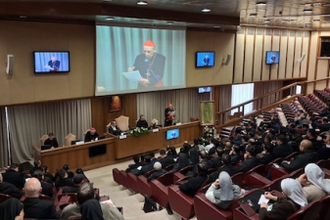Profile: Bishop Victor Guazzelli
Bishop Victor Guazzelli died on Tuesday, after a long illness. Greg Watts wrote the following article about him in May 1999.
Have you ever wondered about those odd sounding titular sees - extinct dioceses given to auxiliary bishops - that some bishops have?
Bishop Victor Guazzelli, the retired Bishop in East London was given Lindisfarne as his. The home of Cuthbert and Aidan, the monastic community at Lindisfarne played a crucial role in the spread of Christianity in seventh century Britain.
And it also enabled Bishop Guazzelli to acquire membership of Shooters Hill Golf Club. We all know the importance of golf for the clergy. So keen are some of them about it that you begin to wonder if there's actually an eighth sacrament that us laity haven't been informed about. And Bishop Guazzelli likes nothing better than to exchange his crozier for a three iron and get out onto the freeway. "A golf course is a jolly good thing. You're walking on grass and you can smell grass," he enthuses as we sit in one of those spartan reception rooms at Clergy House, Westminster. "And you can knock the ball about." Then a note of sadness enters his voice. "Golfing now is so darned expensive though."
The Lindisfarne incident occurred some years ago when he applied to join Shooters Hill Golf Club, where a friend was a member. The committee were tickled that a bishop had applied for membership but pointed out that there was a five year waiting list. But hearing that Bishop Guazzelli's titular see was Lindisfarne, one of them said, "Ah, isn't that an island? Well, then, you can become an overseas member."
Since retiring last year and leaving his beloved East End for a new home at Clergy House, you might think that Bishop Guazzelli would be spending most of his time on the golf course. After all, he's 79 and has worked as a priest for 54 years. But no. He has chosen to keep himself busy, helping Cardinal Hume prepare Westminster parishes for the Holy Year, assisting with Masses and Confession at the cathedral, and acting as a sort of flying bishop around the archdiocese.
Small and stocky with a welcoming grandfather's face it would, perhaps, be hard to find a bishop anywhere who has been held with such affection and respect, amongst Catholics and non-Catholics alike.
His main task now, he explains, is to assist Cardinal Hume in preparing Catholics for the Holy Year. In practical terms, this means encouraging people to read scripture in small groups "in the pattern of basic communities in South America. Our people were never taught to read the scriptures for themselves. Now they are."
But does he miss being the Bishop in East London?
He shakes his head in a sort of you-must-be-joking kind of way.
" I enjoyed my time as bishop but the thing I like most now is that freedom from responsibility. You are at people's demands - but that's what you're ordained for. People always like having a bishop if there's any kind of celebration."
Unsurprisingly, Bishop Guazzelli has always seen himself as a grass roots man rather than the aloof figure from head office.
"As a bishop, there are so many meetings that have very little to do with pastoral activity. I often found them tedious and purposeless. If they concern pastoral matters and people that was different. Administrative matters are not my scene."
His pastoral area consisted of forty parishes grouped in four deaneries, taking in the London boroughs of Camden, Hackney, Tower Hamlets and Islington.
The title "Bishop in East London" is a little misleading, he acknowledges. Hampstead is, as its well-heeled residents will tell you, most definitely not in east London, thank you very much. And the diocese of Brentwood, Bishop McMahon will have you know, swallows up a big chunk of east London.
Reflecting back over his years wearing the mitre, he says he saw his function not in terms of power but of service. And he always attempted to treat his fellow priests as friends rather than subjects.
What he often found most draining were the functions he would be obliged to attend after a Mass.
"The thing I most enjoyed was confirmations. People sometime say, 'Don't you ever get bored? You're doing the same thing over and over again." I reply, no I'm not. They are all new people."
Bishop Guazelli witnessed a remarkable change in Tower Hamlets during his 28 years as bishop. Back in 1970, when he was consecrated East London's first and last bishop (the Vatican is now replacing area bishops with episcopal vicars), the once bustling docks had become derelict. Today, warehouses have become luxury riverside apartments and the gleaming Canary Wharf, the tallest office block in Europe, has become the symbol of a new and arrogant London.
However, the arrival of the suits with their flashy cars has and mobile phones, has, some believe, been at the expense of the indigenous community who have seen little of this new money trickle their way.
Bishop Guazzelli, like Cardinal Manning, who sided with the dockers in their strike in 1889, has always been a champion of the East Enders and has not been afraid to support the ordinary folk in their struggles with bureaucracy and big business.
"East London was always renowned for its community spirit and community sense and there's still a great deal of that around."
Unlike Cardinal Manning, Bishop Guazzelli is an East Ender, and, like many, the offspring of immigrant parents, in his case Italian.
"My parents were poor. We lived in a three-storey house which had two rooms on each floor. There were three families in the house. But we had a great sense of family, community and friendship," he says nostalgically of his childhood in Stepney.
His sister is still alive and he visits her each week. Sadly, two other sisters died in childbirth, as, he notes, was often the case in those days.
He talks affectionately of his father who used to sell ice from a horse and cart, of King Edward Park and of developing a fascination with the sea early on.
"In those terraced houses in London people used to treat each other much better. As a child, I used to play football and cricket in the street. Today, young children haven't got the play space, especially in Tower Hamlets."
At the age of fifteen he felt he had a vocation to the priesthood and soon found himself packing a suitcase for the English College in Lisbon.
"I was terribly homesick at first," he admits, running his hand along the side of the table. "I had no idea of what leaving home would be like. When I saw my mother and father waving on the dock side at Southampton it really hit me."
Little did he know that it would be ten years before he walked the familiar streets of the East End again.
"My mother saw me leave at fifteen and then the next time she saw me I was a priest at the age of twenty-five."
After ordination in 1945, he returned to England became a curate at St Patrick's, Soho Square, where much of his time was spent instructing converts on a one to one basis. Three years later he was recalled to the English College, where he spent the next ten years teaching church history and scripture.
"I really had to start from scratch," he says. "I had to work really hard. But it did me good. I've always maintained since then that if you really want to learn something, teach it."
In 1958 he was appointed sub-administrator at Westminster Cathedral, a post he held until he became parish priest at St Thomas of Canterbury, Fulham, nine years later.
He sparkles when talking about his three years at Fulham where he always had two or three missionary priests staying in the presbytery with him.
"It was lovely. With your first parish you always fall in love with it, he smiles, digging his hands into his jacket pockets."
Consecrated by Cardinal Heenan in 1970, he soon got stuck in to his mini-diocese of East London, pioneering a new style of parish mission.
A team of young priests moved around the area, spending six weeks in a parish, celebrating house Masses and building up a sense of community.
It was very successful, claims Bishop Guazelli, but after four years had to be abandoned due to a shortage of priests.
After studying models of Church in Kenya, Brazil and the Philippines, he held the first East London Pastoral Assembly in 1979 to involve the laity in identifying pastoral priorities. These were then implemented in the following years.
He also broke new ground by signing a covenant to work with Anglican, Methodist, Baptist and United Reformed Church leaders, which at the time he heralded as "a unique adventure in ecumenism".
Even though he's not a committee man, over the years Bishop Guazzelli has participated in many church bodies, including the national council for the lay apostolate, charismatic renewal and the committee for faith and culture.
The charismatic renewal movement is important in the life of the Church, he suggests, but in no way does it have a monopoly on the Holy Spirit as some of its adherents seem to think.
The Holy Spirit will play a greater role in the Church in the next century, he predicts. "Pope Paul V1 said twenty-three years ago - I think - that we would have to develop a devotion to the Holy Spirit in the Church, just as the Holy Spirit was important to get Vatican II thinking along the right lines."
He's always been an outspoken campaigner for peace and is still president of Pax Christi. In 1982 during the Falklands conflict he was embroiled in controversy when he broke ranks from the Catholic Bishops Conference and condemned Britain for going to war.
Conservative MP Patrick Wall urged Cardinal Hume to discipline his auxiliary but, tellingly, the Cardinal refused.
Apart from playing golf, he enjoys listening to opera CDs - "but opera's too expensive to go to" - and thinks videos "a marvellous thing".
He gave up going to the cinema forty years ago, he says, as he always came out with a splitting headache. Referring to newspapers, he describes himself as "a headline man", adding that there is so much that you feel you should read nowadays. He enthuses about the biography of Thomas Cranmer he's currently reading and says he's finding some new insights into the Reformation period. He still retains a strong sense of both his Italian and East End roots.
"Mentally, I'm English but emotionally I'm Italian," he says, adding that having spent twenty of his first thirty-eight years in Portugal he has a great affinity with the country and its culture.
So how long will he stay at Clergy House? "This is my home now. I have two rooms and my own set up," he replies. And, of course, he's got his golf clubs.















